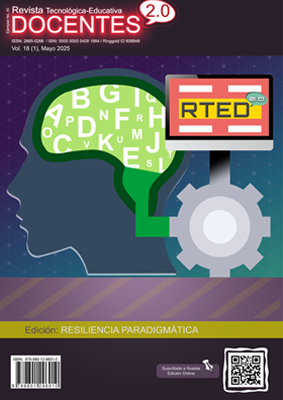The Role of the University Teacher in Oral Health: Towards Comprehensive and Transformative Training
 DOI:
https://doi.org/10.37843/rted.v18i1.641
DOI:
https://doi.org/10.37843/rted.v18i1.641
Main Article Content
Abstract
In the university context, the role of oral health instructors is indispensable, not only because they are responsible for transmitting technical knowledge but also because of their responsibility to train professionals committed to a comprehensive, ethical, and transformative vision of health. This postdoctoral research aimed to investigate the role of university instructors in oral health to promote comprehensive and transformative training that responds to the sector's current needs. The research was conducted within the humanistic paradigm, with a hermeneutic method, a qualitative approach, a narrative design, an interpretive approach, and a cross-sectional approach. The study was conducted with a purposive sample of 10 university instructors from the Faculty of Dentistry at the Central University of Venezuela, selected for their academic background, clinical experience, and willingness to participate. Semi-structured interviews and open-ended questionnaires validated by expert judgment were used to collect data. Data analysis was performed using thematic coding with the support of Atlas. ti software, allowing for identifying emerging categories such as perception of the teaching role, integration of bioethics, and pedagogical training needs. The results reveal a gap between current teaching practice and the principles of transformative education. It is concluded that it is urgent to implement institutional strategies that strengthen university professors' pedagogical, ethical, and reflective training geared toward social well-being and improving public health.
Downloads
Metrics
Article Details

This work is licensed under a Creative Commons Attribution-NonCommercial-NoDerivatives 4.0 International License.
Those authors who have publications in our journal accept the following terms:
- When a work is accepted for publication, the author retains rights of reproduction, distribution of his/her article for exploitation in all countries of the world in the format provided by our magazine and any other magnetic medium, optical, and digital.
- Authors will retain their copyright and guarantee the journal the right first to publish their work, which will be simultaneously subject to the Creative Commons Acknowledgment License (Attribution-NonCommercial-NoDerivatives 4.0 International (CC BY-NC-ND 4.0)). That allows third parties to copy and redistribute the material in any medium or format, under the following conditions: Acknowledgment - You must properly acknowledge authorship, provide a link to the license, and indicate if any changes have been made. You may do so in any reasonable way, but not in a way that suggests you have the licensor's endorsement or receive it for your use. NonCommercial - You may not use the material for a commercial purpose. NoDerivatives - If you remix, transform, or build from the material, you cannot broadcast the modified material. There are no additional restrictions - You cannot apply legal terms or technological measures that legally restrict you from doing what the license allows.
- Authors may adopt other non-exclusive license agreements to distribute the published version of the work (e.g., deposit it in an institutional archive or publish it in a monographic volume) provided that the initial publication in this journal is indicated.
- Authors are allowed and recommended to disseminate their work through the Internet (e.g., in institutional telematic archives, repositories, libraries, or their website), producing exciting exchanges and increasing the published work's citations.
- Request of withdrawal an article has to be done in writing by the author to the Editor, becoming effective after a written response from the Editor. For this purpose, the author or authors will send correspondence via e-mail: [email protected].
- The author will not receive financial compensation for the publication of his work.
- All Docentes 2.0 Journal publications are under the Open Journal System (OJS) platform at: https://ojs.docentes20.com/.
References
Arias, F. (2006). El proyecto de investigación: Introducción a la metodología científica (5ta ed.). Editorial Episteme.
Bolívar, A. (2015). La narrativa como enfoque de formación del profesorado. Ediciones Morata.
Castro, J. P., & Martínez, A. (2020). Formación continúa de docentes en salud: un modelo de intervención. Revista de Educación y Salud, 12(2), https://doi.org/10.33554/riv.15.2.890 DOI: https://doi.org/10.33554/riv.15.2.890
Fernández, R. M., & Salas, P. (2022). Innovación educativa en la formación de docentes en salud bucal: un enfoque basado en competencias. Revista de Innovación Educativa).https://doi.org/10.55777/rea.v15i29
González, M. A., & Pérez, J. R. (2020). Metodologías activas en la formación docente en salud bucal. Revista de Educación en Salud.https://doi.org/10.30827/profesorado.v24i2.13565
Hernández, F. J., & Torres, L. (2022). Metodologías de enseñanza en salud bucal: un enfoque centrado en el estudiante. Revista de Investigación Educativa.https://doi.org/10.14201/teri.25600 DOI: https://doi.org/10.14201/teri.25600
Hernández-Sampieri, R. & Mendoza, C (2018). Metodología de la investigación. Las rutas cuantitativa, cualitativa y mixta. https://doi.org/10.22201/fesc.20072236e.2019.10.18.6 DOI: https://doi.org/10.22201/fesc.20072236e.2019.10.18.6
Imbernón, F. (2017). La formación del profesorado en el siglo XXI: Nuevas tendencias. Editorial Graó.
López, M. E., & Ruiz, C. (2019). La enseñanza de la salud bucal en la formación docente: un análisis crítico. Journal of Dental Education. https://doi.org/10.51798/sijis.v2i4.127 DOI: https://doi.org/10.51798/sijis.v2i4.127
Martínez, L. E., & Torres, S. (2019). La formación integral del docente en salud: un enfoque interdisciplinario. Journal of Health Education Research&Development. http://dx.doi.org/10.5209/RCED.5153637(1)
Morales, A. R., & Sánchez, P. (2023). Competencias docentes en salud bucal: un estudio de caso en universidades latinoamericanas. Educación y Salud Pública. ISBN: 978-607-482-177-2
Mujica-Sequera, R. M. (2019). Sociedad del Conocimiento. Revista Docentes 2.0, 6(3), 9–11. https://doi.org/10.37843/rted.v6i4.75 DOI: https://doi.org/10.37843/rted.v6i4.75
Ramírez, C. J., & López, A. (2021). Estrategias pedagógicas en la enseñanza de la salud bucal: un estudio de caso. Educación y Salud. https://doi.org/10.22592/ode2023n41e105 DOI: https://doi.org/10.22592/ode2023n41e105
Silva, T. A., & Gómez, R. (2021). Desarrollo de competencias docentes en salud bucal: un enfoque integral. Educación Médica. https://dx.doi.org/10.33588/fem.231.1042 DOI: https://doi.org/10.33588/fem.231.1042
Strauss, A., & Corbin, J. (2002). Bases de la investigación cualitativa: Técnicas y procedimientos para desarrollar la teoría fundamentada (2da ed.). Universidad de Antioquia.






